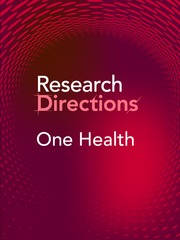Context
Antimicrobial resistance (AMR) is a global health threat to humanity, animals, plants and the wider environment. The intrinsic complexity and interconnectivity of human, animal and environmental factors has now been globally acknowledged and warrants a One Health approach. International communities launched guidelines to support the development and implementation of comprehensive national One Health (OH) AMR strategies with a particular concern for threatened antibiotics. Yet, AMR National Action Plans have proven difficult to implement because of social and structural obstacles/barriers, which are well-known as OH challenges (Keune, Payyappallimana, Morand and Rüegg Reference Keune, Payyappallimana, Morand, Rüegg, Visseren-Hamakers and Kok2022) such as overcoming inter-sectorial and interdisciplinary barriers, taking into account structural societal dynamics, implementing transdisciplinary system’s approaches. To enhance necessary transformative system changes, it is vital to operationalize and contextualize One Health AMR approaches for the design, implementation and evaluation of community-based AMR interventions, tailored to the local circumstances.
We invite papers related to AMR One Health operationalization challenges:
-
How to put AMR reduction and prevention strategies into practice as a One Health approach? Case studies.
-
How to deal with multi-level and multi-stakeholder AMR governance in a One Health perspective?
-
How to handle AMR policy across international, national systems and social scales taking into account a One Health approach?
-
How to weigh scientific and other evidence on AMR from a One Health perspective?
-
How to organize AMR science – policy – society interfaces in a One Health perspective?
-
How to (co-)design AMR decision support as a One Health approach?
-
How One Health approaches can help to improve national environmental AMR law implementation?
-
How ethics should envision AMR in a One Health perspective.
-
How can actors be supported to avoid the fallacy of an ad hoc reductionist response to the complex AMR crisis by implementing a One Health approach?
How to contribute to this Question
If you believe you can contribute to answering this Question with your research outputs find out how to submit in the Instructions for authors (https://www.cambridge.org/core/journals/research-directions-one-health/information/author-instructions). This journal publishes Results, Analyses, Impact papers and additional content such as preprints and “grey literature.” Questions will be closed when the editors agree that enough has been published to answer the Question so before submitting, check if this is still an active Question. If it is closed, another relevant Question may be currently open, so do review all the open Questions in your field. For any further queries check the information pages (https://www.cambridge.org/core/journals/research-directions-one-health/information/about-this-journal) or contact this email (OneHealth@cambridge.org).
Competing interests
The author(s) declare none.




